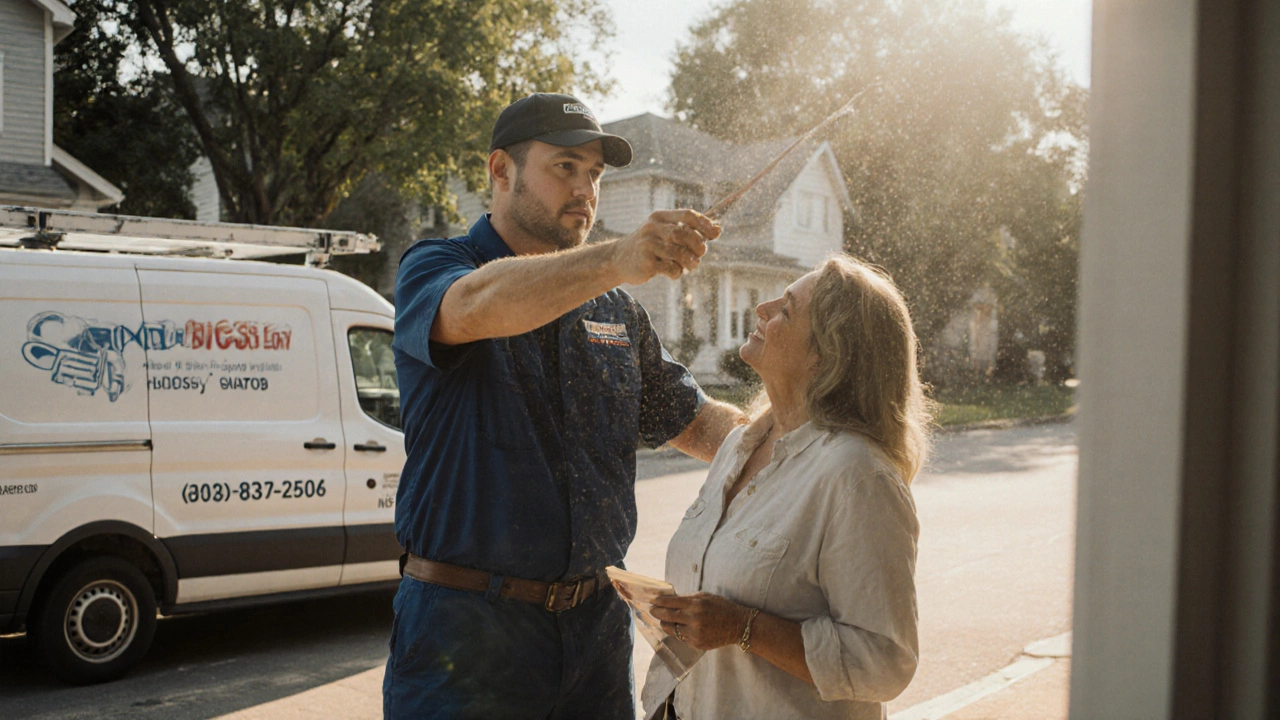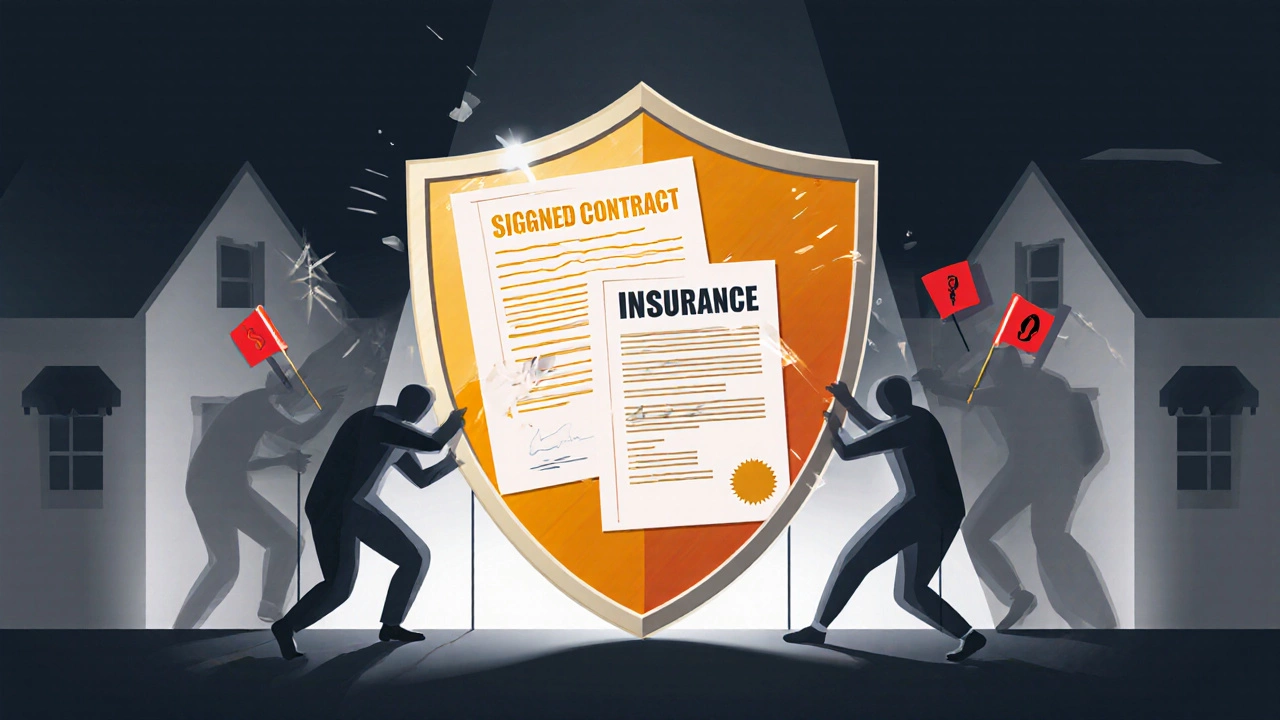How to Find a Reputable Contractor in Your Area
 Oct, 28 2025
Oct, 28 2025
Contractor License Checker
Verify Contractor License Status
Check if a contractor is licensed and in good standing with your state's licensing board
Choosing the wrong contractor can cost you thousands-delayed projects, shoddy work, or worse, a contractor who vanishes after taking your deposit. You’re not just hiring someone to do a job; you’re letting them into your home, handling your money, and making decisions that affect your safety and property value. So how do you find someone you can actually trust?
Start with local recommendations
Word of mouth still beats any online ad. Ask neighbors, friends, or coworkers who’ve recently done renovations. Don’t just ask, “Who did you use?” Ask, “Would you hire them again?” and “What surprised you-good or bad?” People remember details: delays, clean-up habits, how they handled mistakes. A contractor who shows up on time, calls when they’re running late, and fixes a mistake without arguing is rare-and worth holding onto.
Check community boards, Nextdoor, or Facebook groups for your neighborhood. Look for posts with photos of finished work. Real people post before-and-after shots, honest reviews, and even receipts. Avoid groups where every review is five stars and reads like an ad. Authentic feedback includes complaints-and how the contractor responded.
Verify licenses and insurance
Never hire a contractor without checking their license. In most states, any contractor doing work over $500 must be licensed. Go to your state’s licensing board website-search “[Your State] contractor license lookup.” Type in their name or license number. If the site says “inactive,” “suspended,” or “no record,” walk away.
Insurance is just as important. Ask for proof of general liability and workers’ compensation. Liability insurance covers damage to your property. Workers’ comp protects you if one of their crew gets hurt on your property. If they can’t or won’t show you current certificates, they’re cutting corners-and you could be on the hook for medical bills or lawsuits.
Get at least three detailed bids
A low bid isn’t a deal-it’s a red flag. Contractors who underbid often skip materials, rush the job, or add hidden fees later. Compare apples to apples. Each bid should include:
- Exact materials (brand, model, grade)
- Timeline with start and end dates
- Payment schedule (never pay more than 10-20% upfront)
- Warranty terms (labor and materials)
- Permit responsibility (they should pull them, not you)
If one bid is way lower than the others, ask why. Maybe they’re using cheaper drywall, skipping insulation, or not including cleanup. Don’t assume they’re just cheaper-assume they’re cutting something important.

Check their past work
Ask for a list of three recent jobs in your area. Call those homeowners. Ask: “Was the work done on time?” “Did they clean up?” “Did they fix problems without pushing extra charges?”
If they say, “I can’t give you references,” that’s a dealbreaker. If they only have photos from their website, ask to see the actual site. Drive by. Look at the finish work-trim, paint lines, tile grout. A professional contractor cares about details. Crooked baseboards or uneven paint are signs of rushed work.
Read reviews, but know where to look
Google Reviews and the Better Business Bureau (BBB) are your best bets. Look for patterns. Ten five-star reviews with no comments? Suspicious. Three four-star reviews with detailed stories about communication and follow-through? That’s real.
Watch for complaints about:
- Changing prices mid-job
- Missing deadlines
- Refusing to fix mistakes
- Using subcontractors without telling you
Also check Yelp and Angi (formerly Angie’s List). Angi vets contractors, so a “Pro” designation means they passed background checks and insurance verification. But don’t rely on it alone-some contractors buy their way onto those lists.
Trust your gut
Contractors aren’t salespeople. If they pressure you to sign right away, offer a “limited-time discount,” or make you feel guilty for asking questions, walk away. Reputable contractors expect you to compare options. They’ll answer your questions calmly, show you samples, and give you time to decide.
Pay attention to how they communicate. Do they return calls within a day? Do they show up on time for meetings? Do they explain things clearly, or do they talk over you like you don’t know anything? How they treat you before you hire them is how they’ll treat you during the job.

Sign a written contract
Never start work without a signed contract. It should match the bid exactly. No verbal promises. If they say, “Oh, we’ll add that for free,” get it in writing. The contract must include:
- Full legal name and license number
- Start and completion dates
- Payment schedule (with no large upfront payments)
- Materials list with brand and model numbers
- Warranty details
- How change orders are handled (and priced)
- Who pulls permits
- Clean-up expectations
And always keep a copy. If things go sideways, you’ll need it.
Pay smart, not fast
A common scam: pay 50% upfront, then they disappear. Reputable contractors ask for 10-20% to cover materials. The rest is paid in stages: 30% after framing, 30% after drywall, 10% after final walkthrough. Never pay the full amount until you’ve inspected everything and they’ve cleaned up.
Use a credit card if possible. It gives you chargeback protection if the work is incomplete or defective. Avoid cash payments. No receipt? No recourse.
What to do if something goes wrong
If the contractor disappears, does bad work, or refuses to fix issues:
- Document everything-photos, texts, emails
- Call your state’s contractor licensing board-they can investigate and may fine or suspend the contractor
- File a complaint with the BBB
- Check if your homeowner’s insurance covers contractor fraud
- Small claims court is an option for disputes under $10,000
Most problems happen because people skip the steps above. Don’t rush. Don’t assume. Verify. Ask. Compare. Write it down.
How do I know if a contractor is licensed in my state?
Go to your state’s contractor licensing board website and search by name or license number. Most states have a free public lookup tool. If you can’t find it, search “[Your State] contractor license verification.” If the contractor can’t provide their license number or says they don’t need one, walk away.
Should I hire a contractor who works out of their home?
Yes-if they’re licensed, insured, and have solid reviews. Many reputable contractors run small businesses from home. What matters is their track record, not their office location. Ask for references, check their insurance, and verify their license. A home-based business doesn’t mean they’re less professional.
Can I hire a friend or family member as a contractor?
You can, but treat it like a business. Get everything in writing-scope, timeline, payment, warranty. Even if you trust them, misunderstandings can ruin relationships. A written contract protects both sides. If they’re not licensed or insured, you’re taking on legal and financial risk.
How long should a contractor’s warranty last?
Labor warranties should last at least one year. Some offer two or more, especially for major work like roofing or windows. Material warranties come from the manufacturer-like a 25-year warranty on shingles or a 10-year warranty on siding. Make sure the contract lists both.
Is it okay to pay a deposit before work starts?
Yes, but only a small one-10% to 20% maximum. This covers the cost of ordering materials. Anything higher is risky. Reputable contractors won’t ask for more. If they do, it’s a red flag. Never pay in full upfront, and avoid cash payments without a receipt.
